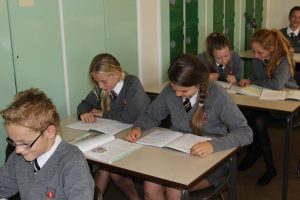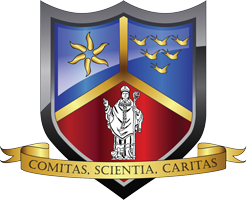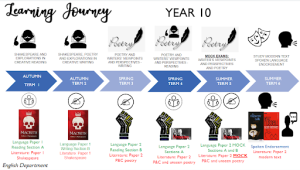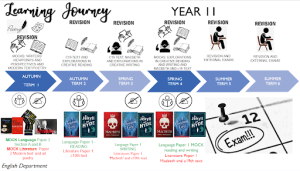English
The intended impact of the English curriculum at St Richard’s Catholic College:
Our aim is to create successful users of the English language: literate, confident, empathetic team players and leaders. We are creating successful readers, writers and speakers who read widely around the curriculum, for educational purposes and pleasure. We are investing in explicit vocabulary instruction to combat word poverty and the Matthew effect in education. Through a creative, stimulating, and rigorous curriculum, we are developing well-rounded individuals who will contribute positively to their community and the wider world.
 However, English lessons are not merely a means to an end. At St. Richard’s, our lessons provide pupils with the opportunity to enjoy using language and to explore and deepen their appreciation of Literature. Qualifications in English at GCSE level are beyond doubt of vital importance in securing a place on the career ladder, but we seek to provide all of our pupils with a love for the subject which will last them for a life-time!
However, English lessons are not merely a means to an end. At St. Richard’s, our lessons provide pupils with the opportunity to enjoy using language and to explore and deepen their appreciation of Literature. Qualifications in English at GCSE level are beyond doubt of vital importance in securing a place on the career ladder, but we seek to provide all of our pupils with a love for the subject which will last them for a life-time!
Meet the Department
- Miss Rowland – Subject Leader for English and Literacy Coordinator
- Mrs Di Mascio – Teacher of English KS4 Coordinator
- Mrs Wood – Associate Assistant Principal and Teacher of English
- Mrs Bayjou-Bates – Teacher of English KS3 Coordinator
- Mrs Hills – Teacher of English & LAC designated teacher, Pastoral Leader Year 9
- Mr Maxwell – Teacher of English
- Mrs Niitsoo- Teacher of English
- Miss McKay – Teacher of English, SEN champion
- Mr Steele – Teacher of English & Media Studies, Year 8 Pastoral Leader
- Mrs Broderick -Teacher of English
GCSE success
Below is a breakdown of our teacher assessed grades for Summer 2023:
| English Language | English Literature | |
| 7+ | 30.93% | 35.05% |
| 5+ | 71.65% | 74.74% |
| 4+ | 87.11% | 88.66% |
Key Stage 3 Curriculum
Our curriculum is deliberately knowledge rich and sequenced to enable students to build knowledge over time. This will allow them to understand more complex ideas and master the skills required to undertake more complex tasks progressively.
Our aim is to return to embed and deepen our students’ understanding of key principles over time. These concepts are interleaved across KS3 and what is covered is layered to develop in complexity over time.
All pupils currently have 4-5 lessons per week in Y7, Y8 and Y9. Y7 and 8 are expected to have one library lesson per week whilst this is reduced to one per fortnight in Y9. Pupils in Year 7-9 will be encouraged to participate in the Rooted in Reading scheme where they receive rewards for more challenging reads.
We have two nurture groups in Y7 who are expected to follow the same curriculum model which is differentiated to meet their needs. Pupils in nurture have a variety of social, emotional and SEND needs. Apart from the nurture group, our KS3 classes are mixed ability throughout.
In Year 7, pupils study 6 units: The Origins of Literature, a novel, extracts from Shakespeare, Travel Writing and Media Studies.
In Year 8, pupils study 6 units: A novel, Frankenstein (the play script), Shakespeare’s The Tempest, Stories of Survival, Identity and Culture and Dystopian Studies.
In Year 9, pupils study 4 units: A novel, Gothic Literature, Shakespeare’s Romeo and Juliet, and Poetry.
Spelling, punctuation and grammar skills are taught alongside all units.
Key Stage 4 Curriculum
Pupils begin the GCSE curriculum in English Language, Literature and Spoken Language in year 10. We follow the AQA specification for all three disciplines. English Language consists of two exams (creative and viewpoints). English Literature consists of four texts in two exams (poetry anthology, Shakespeare, twentieth century text and nineteenth century text).
Spoken Language assessment consists of a formal speech, video recorded. Each term has a Literature and Language focus and then an interleaving approach means these topics/skills are revisited throughout the year.
Summary of how pupils are assessed and how impact is measured
At Key Stage 3 (Years 7 – 9) all pupils’ progress is assessed formally once a term using a department score system. This is across a range of Reading and Writing assessment focuses. In addition to this, formative teacher and peer comments support pupils’ learning and progress. Verbal feedback is given regularly in class. All pupils’ reading and spelling ages are tested on entry in Year 7 and those of concern are tracked and re-tested regularly, once intervention has been put in place.
At Key Stage 4, pupils are assessed in line with the AQA GCSE specifications. Class work and exam preparation are marked twice a term and formative comments are given in between these times. Live marking and verbal feedback is given to pupils every lesson and pupils regularly self and peer assess their work. This assists the pupils with relating to mark schemes and success criteria. The department completes regular moderation to ensure consistency across teachers.
Pupil Voice is also sought regularly as a way of ensuring lessons are impactful and engaging.
The department offers: Debate Club, Poetry by Heart and Creative Writing Club as well as numerous theatre trips, drama workshops and author/illustrator visits throughout the year.
Links to the GCSE specifications:
Reading list
We encourage all pupils to read widely to promote growth of vocabulary and encourage a love of a variety of literature. Parents and carers can find a comprehensive list of reading books for every year group by clicking the following link: https://schoolreadinglist.co.
Bedrock Vocabulary
Bedrock Vocabulary is an online vocabulary curriculum which we have invested in since May 2019. It has been an invaluable resource for our pupils. Bedrock Vocabulary teaches vocabulary explicitly, whilst encouraging reading through a range of fiction and non fiction texts. Research has suggested that there is a direct link between a pupils vocabulary size and their academic achievement. Narrow vocabularies affect pupils’ grades which is why we are using Bedrock to help close the vocabulary gap. More information about our Bedrock Vocabulary initiative can be found here https://bedrocklearning.org/





